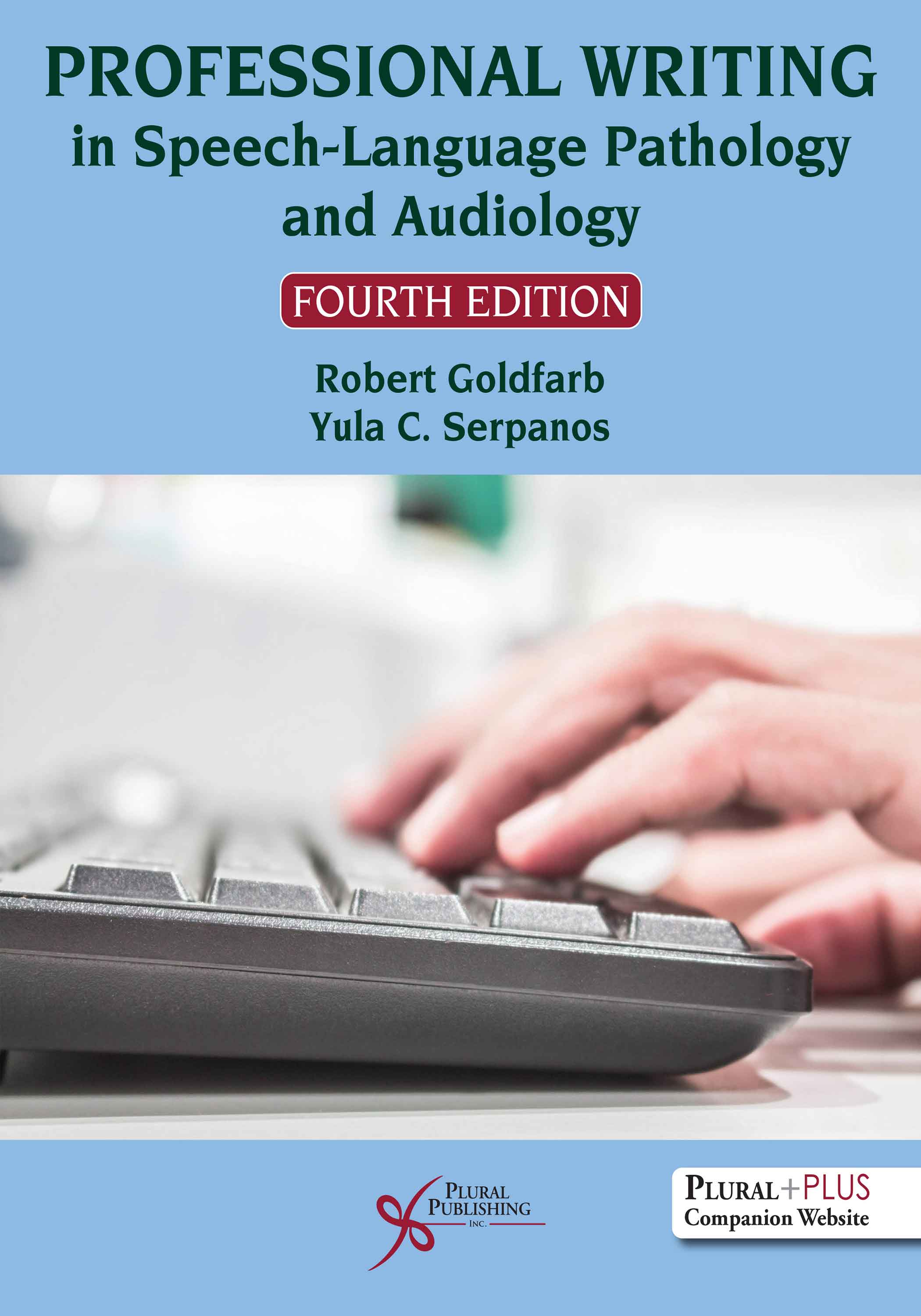
Professional Writing in Speech-Language Pathology and Audiology
Fourth Edition
Robert Goldfarb, Yula C. Serpanos
Details: 393 pages, B&W, Softcover, 8.5" x 11"
ISBN13: 978-1-63550-701-0
© 2025 | Available
For Instructors
Purchase
With many more exercises, writing samples, and online resources, Professional Writing in Speech-Language Pathology and Audiology, Fourth Edition is an excellent resource for students of communication sciences and disorders. It is often used as a textbook for courses in professional writing, clinical methods, and professional issues. Throughout the text, the authors use anecdotal material, self-help questions, and humor to illustrate that learning to be a better professional writer does not require drudgery.
The authors cover a spectrum of subjects related to professional writing, including, rules of writing (review of grammar, spelling, punctuation, semantics, and sentence structure), evidence-based writing and citing sources, ethics related to professional writing, writing diagnostic and clinical reports, and writing for professional career advancement.
New to the Fourth Edition
- More exercises throughout the book
- Incorporates APA 7th edition style
- Reorganized for a greater flow of information:
- Combined the chapters on Evidence-Based Writing and Ethics of Professional Writing
- Combined the chapters on Referencing Resources and Internet Resources
- Book now ends with chapter 8 on professional presentations
- Expansion of English mechanics underlying syntax
- Inclusion of the 2023 revised version of the ASHA Code of Ethics
- Additional online resources for instructors and students
Key Features
- Exercises in each chapter
- Numerous samples, including:
- Institutional Review Board Research Review Form
- Authorization of Release of Information Form
- Journal Article Critique
- Diagnostic Reports and Protocol Worksheets
- Therapy Goals and Progress Reports
- Types of Professional Correspondence
- Presentation Slides
- Resumes
PluralPlus Online Ancillary Materials
For instructors: Answer key, FAUST assignment grading rubric
For students: Printable forms/documents, Exercises/activities, Sample presentations
Introduction
Chapter 1. Getting Started
Beginnings of Speech-Language Pathology
Beginnings of Audiology
About the Deaf Community and Hearing Impairment
Current Issues
English Mechanics
Parts of Speech
Grammatical Morphemes
Phrase Structure Rules
Exercises
References
Chapter 2. Writing Rules
Errors in Form
Writing Form (Punctuation, Spelling, Grammatical Morphemes)
Punctuation
Spelling
Grammatical Morphemes and Common Confusions
Writing Content and Composition (Semantics, Sentence Structure)
Exercises
References
Chapter 3. Professional Writing
Part I. Evidence-Based Writing
Writing a Professional Paper/Journal Article
A. Title
B. Abstract
C. Introduction
D. Methods
E. Results
F. Discussion and Conclusion
G. References
Template for a Journal Article Critique
In-Class Assignment
Part II. Ethics of Professional Writing
The ASHA Code of Ethics
Principle of Ethics I
Principle of Ethics II
Principle of Ethics III
Principle of Ethics IV
Health Insurance Portability and Accountability Act of 1996 (HIPAA)
Research With Human Participants
The Belmont Report
Human Participants Research Protection Training
Conclusion
Exercises of Part I. Evidence-Based Writing
Exercises of Part II. Ethics of Professional Writing
References
Appendix 3–A. Sample Institutional Review Board Research Review Form
Chapter 4. Referencing Resources
History of the Library
Collections
Books
Scholarly Journals
Audiovisual Materials
Microforms
Services
The Organization of Information: Catalogs and Databases
Conducting a Search
Interlibrary Loans/Reciprocal Library Privileges
Reference Services
Reserve Items
Course Packs
The Internet
Internet Glossary: An Exercise in Futility
Uses and Abuses
Evaluating Internet Sources for Professional Writing
Which Internet Resources Should We Use (And Which Should We Avoid)?
Final Note
Copyright Material
Plagiarism
Citing and Reporting References
Writing References in APA Style: Review of Selected APA-Style (2020) Reference List and In-Text Citation Formats
Exercises
References
Chapter 5. The Diagnostic Report
Diagnostic Labeling
Threats to Accurate Diagnosis
Rules for Diagnosis
Rule 1
Rule 2
Rule 3
Rule 4
Rule 5
Writing the Diagnostic Report
The Logic of Report Writing
The Diagnostic Report Format
Guidelines for Writing Diagnostic Reports in Speech-Language Pathology and Audiology
Writing Aspects
Format
Sections of the Diagnostic Report
Report Drafts
Writing the History
Diagnostic Report Format — Speech and Language
Referral Information
Background Information
Assessment Information
Clinical Impressions
Recommendations
Diagnostic Protocol Worksheet — Speech and Language
Referral Information
Background Information
Assessment Information
Sample of Diagnostic Report Writing in Speech-Language Pathology
Speech-Language Evaluation Report — Original
Speech-Language Evaluation Report — Revised Version
Diagnostic Report Format — Audiology
History
Assessment Information
Clinical Impressions
Recommendations
Diagnostic Protocol Worksheet — Audiology
History
Assessment Information
Sample of Diagnostic Report Writing in Audiology
Audiologic Evaluation Report – Original
Audiology Evaluation Report – Edited
Exercises
References
Chapter 6. Clinical Goals, Reports, and Referrals
Informed Consent and Permission
Justification
Informed Consent Form
Permission Form
Writing Clinical Observations
Writing Goals for Therapy
Types of Professional Reports
I. Treatment (Therapy Session) Format Plan in Speech-Language Pathology
II. Progress Report
Guidelines for Writing Progress Reports in Speech-Language Pathology
Progress Report: Writing Style Worksheet
Edited Progress Report in Speech-Language Pathology
III. Audiogram Form Report
IV. Medical Chart Logs/Reports
Professional Correspondence
Professional Referrals/Sending Reports
Sample Authorization of Release of Information Form
Correspondence Via Electronic Media
Letters to Professionals
Cover Letters for Professional Reports
Letters as Reports
Exercises
References
Chapter 7. Writing for Professional Advancement
Writing for Professional Advancement
I. Resumes
Do’s
Don’ts
Letterhead
Education
Certifications/Licenses
Professional Experience
Awards/Honors
Publications
Professional Presentations
Research
Professional Affiliations/Activities
Skills
References
Sample Student Resume Format
II. Cover Letters for Resumes
Resume Cover Letter Format
Sample Resume Cover Letter
III. Portfolios
Sample Portfolio Checklist of Clinical Work in Audiology
Sample Portfolio Checklist of Clinical Work in Speech-Language Pathology
IV. Professional Correspondence Via Electronic Media
Sections of Formal Correspondence
Sample Email Correspondence
Multiple-Choice Tests
The Stem
The Options
Graduate Record Examination (GRE®)
Praxis® Examinations in Speech-Language Pathology and Audiology
Exercises
References
Chapter 8. Writing for Professional Presentations
Oral Presentations
Preparing the Presentation
Developing the Presentation
Outlining the Presentation
Delivering the Oral Presentation
Computer-Generated Slide Presentations
Creating Computer-Generated Slide Presentations
Factors in Effective Presentation Delivery
Tips for Delivering the Presentation
Sample Computer-Generated Slide Presentation
Professional Presentations
I. The Poster Presentation
II. The Platform Presentation
III. The Short Course
Exercises
References
Index
Professional Writing in Speech-Language Pathology and Audiology, Fourth Edition comes with access to supplementary student and instructor resources on a PluralPlus companion website.
The companion website is located at: https://www.pluralpublishing.com/publication/pwslpa4e
STUDENTS:
The student resources include exercises and sample presentations.
To access the student resources, you must register on the companion website and log in using the access code located in the front of your textbook.
INSTRUCTORS:
The instructor resources include answer key to the exercises in the book, and a grading rubric for the FAUST assignment. You will also have access to all of the student resources listed above.
To access the instructor resources, you must contact Plural Publishing, Inc. to be verified as an instructor and receive your access code.
Email: instructormaterials@pluralpublishing.com
Tel: 866-758-7251 (toll free) or 858-492-1555
*Note for students: If you have purchased this textbook used or have rented it, your access code will not work if it was already redeemed by the original buyer of the book. Plural Publishing does not offer replacement access codes for used or rented textbooks.
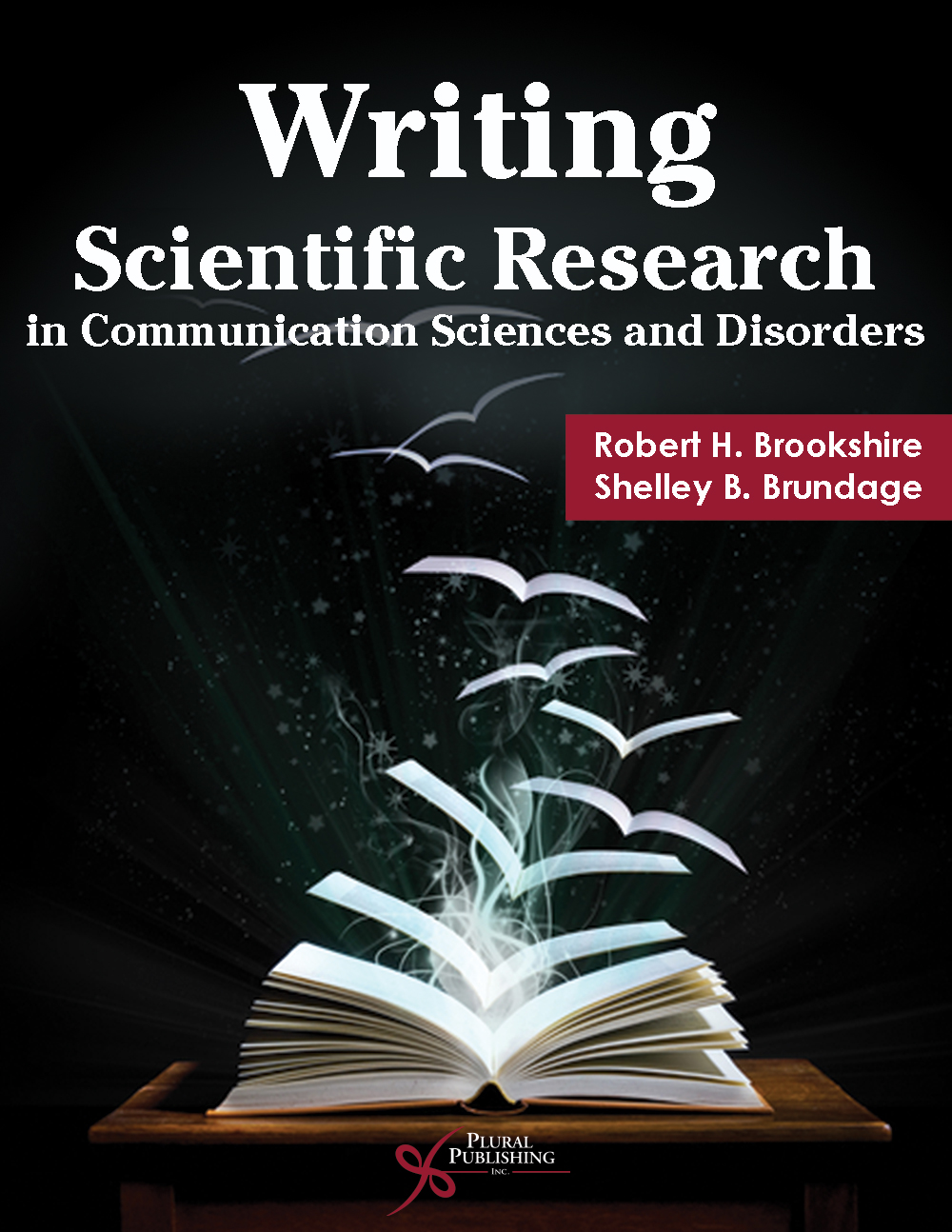
Writing Scientific Research in Communication Sciences and Disorders
First Edition
Robert H. Brookshire, Shelley B. Brundage
Details: 214 pages, B&W, Softcover, 7" x 10"
ISBN13: 978-1-59756-614-8
© 2016 | Available
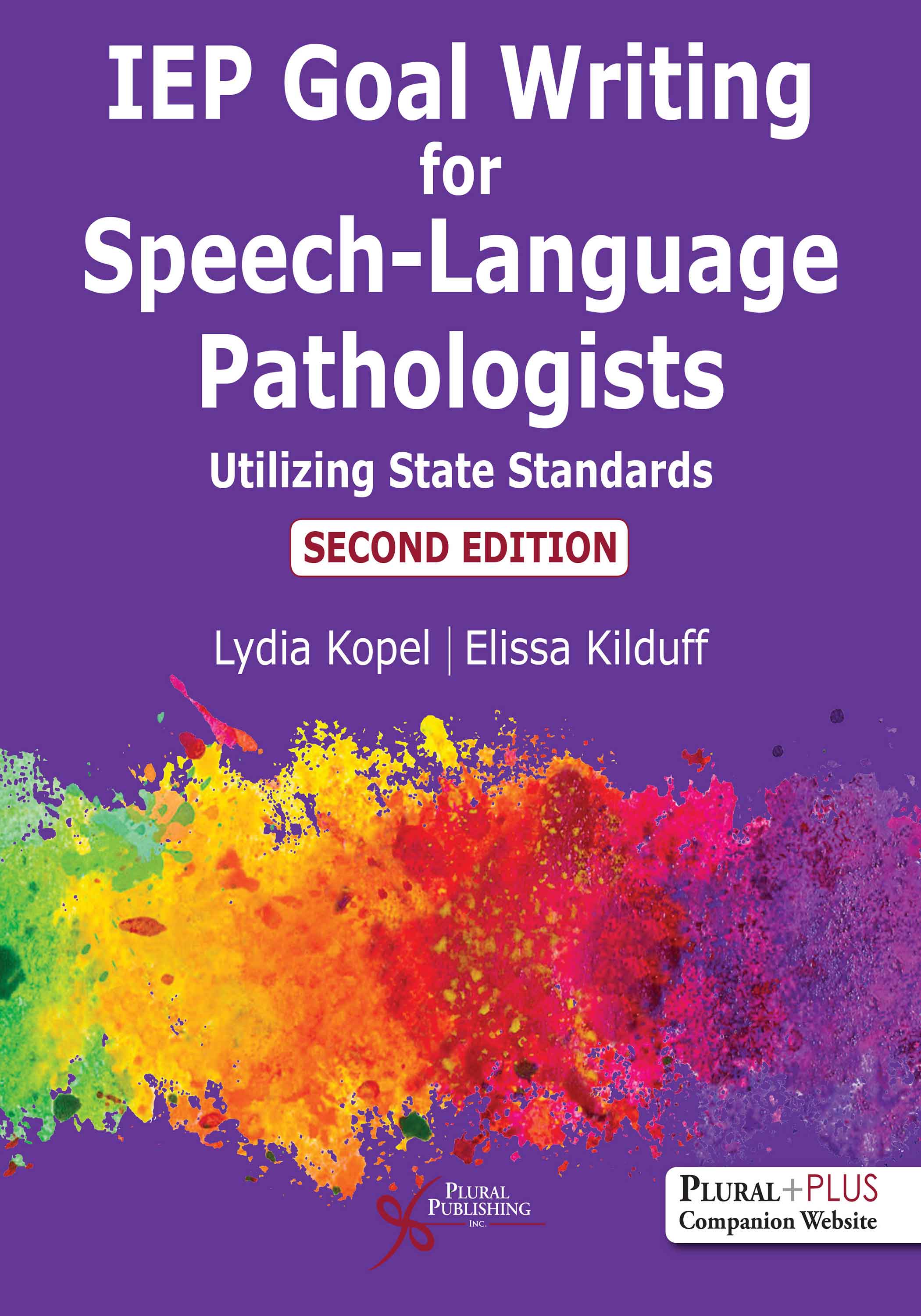
IEP Goal Writing for Speech-Language Pathologists: Utilizing State Standards
Second Edition
Lydia Kopel, Elissa Kilduff
Details: 243 pages, B&W, Softcover with layflat binding, 8.5" x 11"
ISBN13: 978-1-63550-202-2
© 2021 | Available
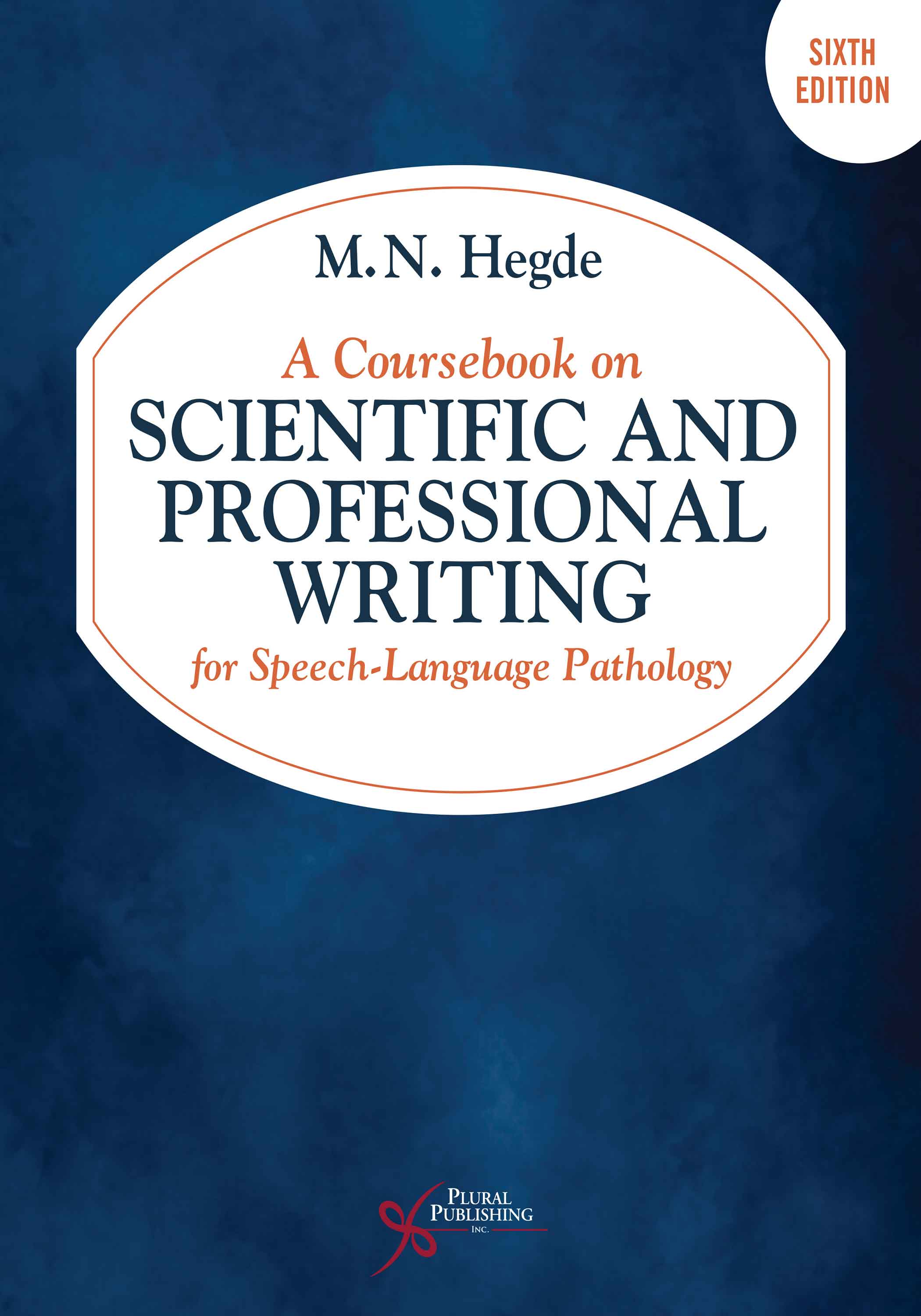
A Coursebook on Scientific and Professional Writing for Speech-Language Pathology
Sixth Edition
M.N. Hegde
Details: 459 pages, B&W, Spiral, 8.5" x 11"
ISBN13: 978-1-63550-401-9
© 2024 | Available
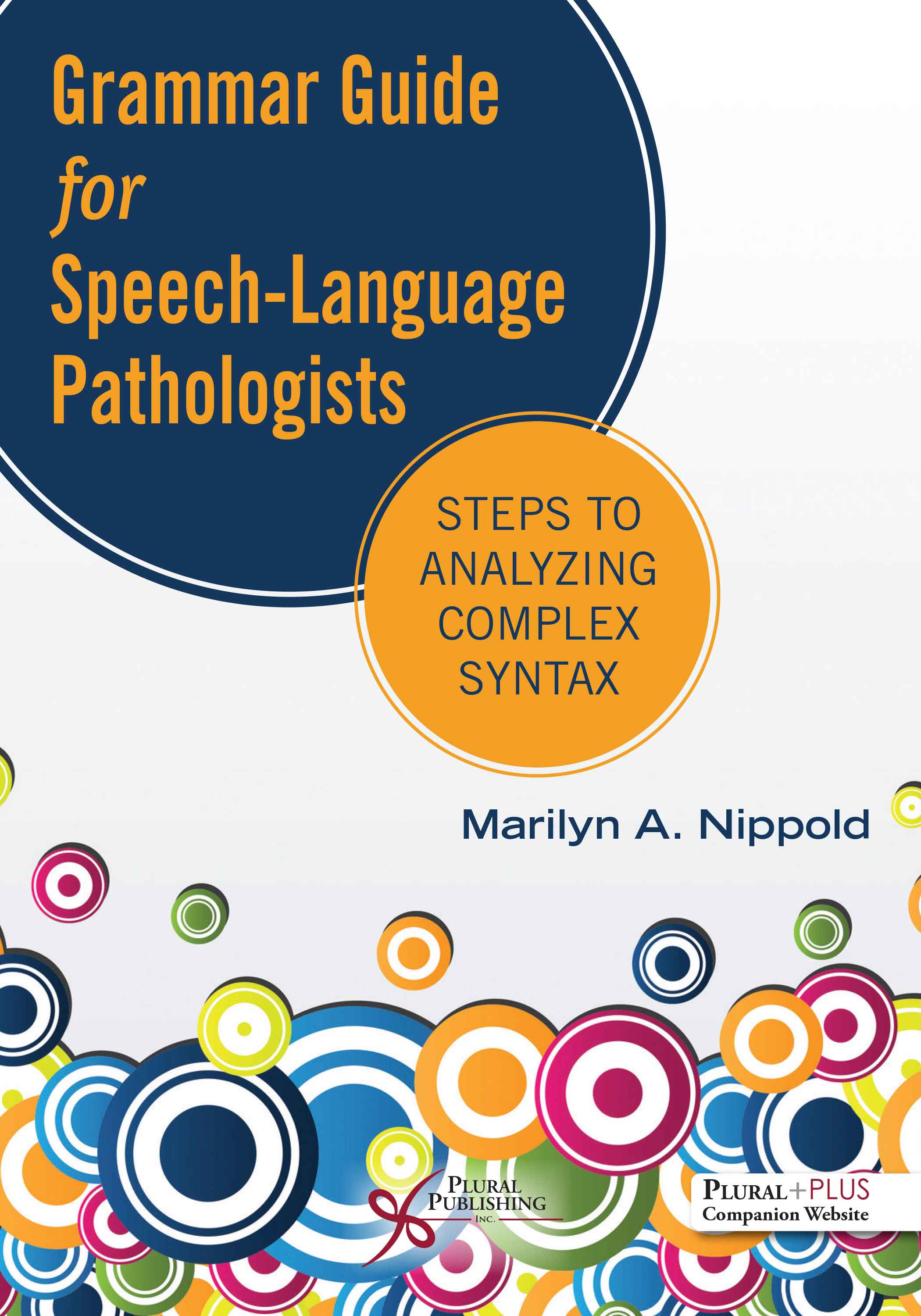
Grammar Guide for Speech-Language Pathologists: Steps to Analyzing Complex Syntax
First Edition
Marilyn A. Nippold
Details: 251 pages, B&W, Softcover, 7" x 10"
ISBN13: 978-1-63550-393-7
© 2023 | Available
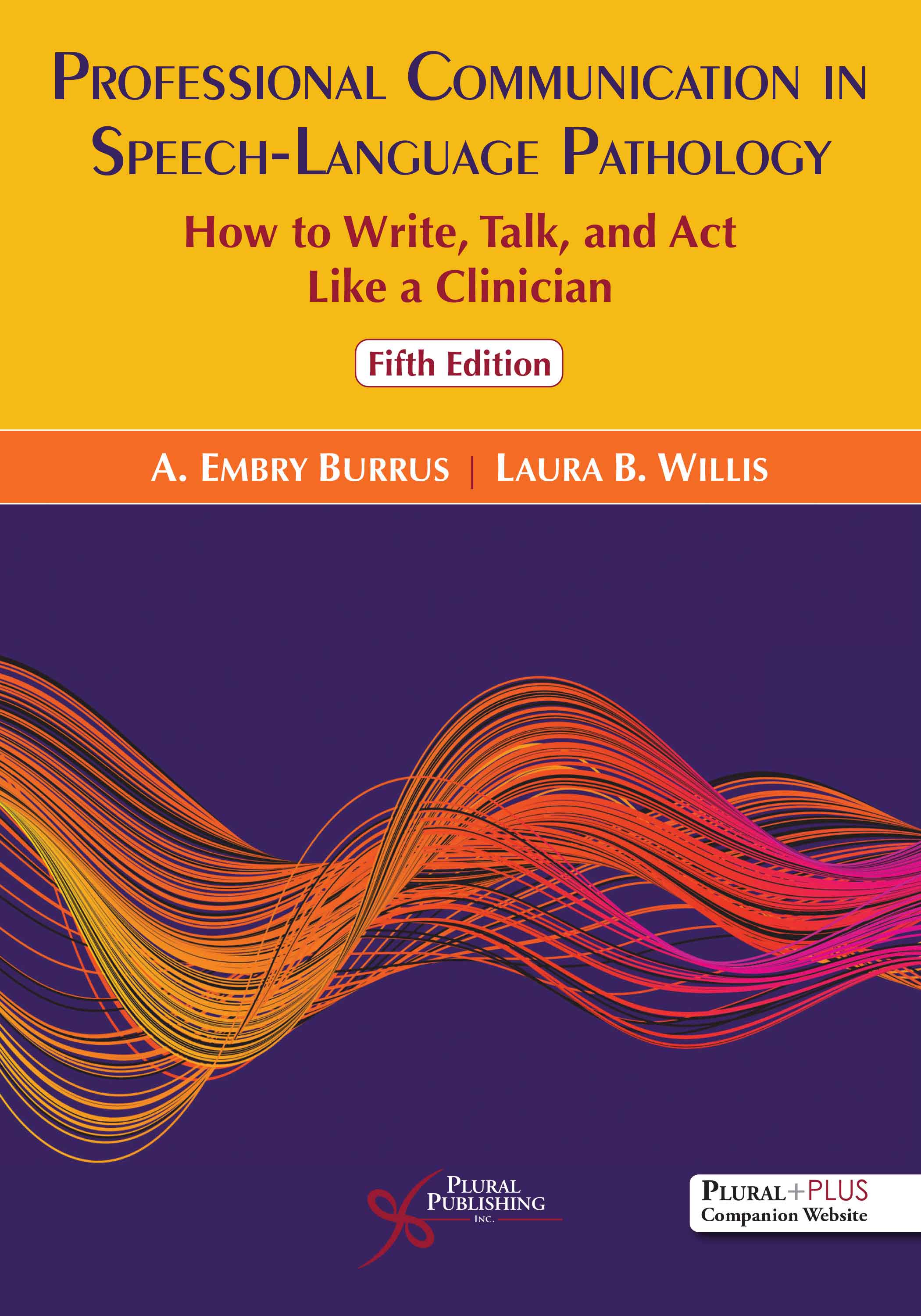
Professional Communication in Speech-Language Pathology: How to Write, Talk, and Act Like a Clinician
Fifth Edition
A. Embry Burrus, Laura B. Willis
Details: 280 pages, B&W, Softcover, 7" x 10"
ISBN13: 978-1-63550-658-7
© 2026 | Available


